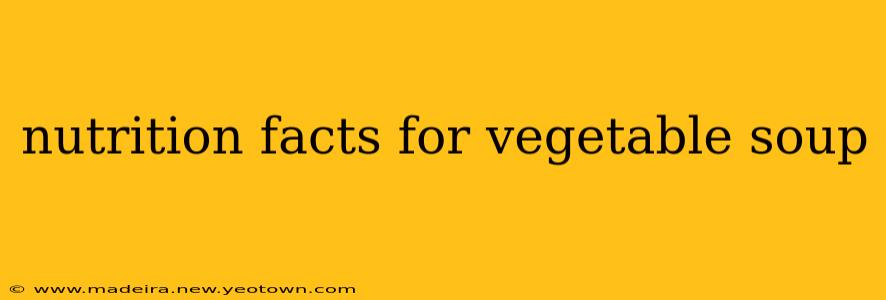Vegetable soup. The very words conjure images of warmth, comfort, and wholesome goodness. But beyond the delightful taste and cozy feeling, lies a nutritional powerhouse often underestimated. Let's uncover the secrets hidden within this humble bowl of goodness, exploring the nutritional facts and answering some common questions.
My name is Anya Petrova, and I'm a registered dietitian with over 10 years of experience helping people understand and improve their diets. I've spent countless hours analyzing food composition and its impact on health, and vegetable soup is a particular favorite of mine because of its versatility and nutritional benefits.
What are the typical nutritional values of vegetable soup?
This is where things get interesting! The nutritional profile of vegetable soup is incredibly variable. It entirely depends on the specific ingredients used. A soup brimming with hearty root vegetables like carrots, potatoes, and parsnips will offer a different nutritional makeup than a lighter broth-based soup featuring leafy greens and herbs.
Generally speaking, a typical serving (around 1 cup) of vegetable soup can provide:
- Calories: Anywhere from 80-200 calories, depending on the ingredients and added fats.
- Protein: A modest amount, ranging from 2-8 grams, mainly derived from legumes (if included) or any added meat.
- Fiber: This is where vegetable soup truly shines! A single serving can contribute a significant amount of fiber, often exceeding 5 grams, aiding in digestion and promoting satiety.
- Vitamins and Minerals: Vegetable soup is a treasure trove of vitamins and minerals. Expect a good dose of Vitamin A (from carrots and other orange vegetables), Vitamin C (from leafy greens), potassium (from potatoes and tomatoes), and various other essential micronutrients. The exact amounts will, again, depend on the specific ingredients.
Does vegetable soup contain a lot of sodium?
Yes, this is a crucial point. The sodium content of vegetable soup can be quite high, depending on the recipe and added ingredients. Many commercially prepared soups are notoriously high in sodium, often exceeding the recommended daily intake in a single serving. Homemade vegetable soup gives you much more control.
By using low-sodium broth and avoiding excessive salt during cooking, you can significantly reduce the sodium content. Fresh herbs and spices can enhance the flavor without relying on salt.
Is vegetable soup healthy for weight loss?
Vegetable soup can be a great addition to a weight loss plan. Its high fiber content promotes fullness and can help curb cravings, preventing overeating. The lower calorie density compared to many other dishes makes it a smart choice for managing your calorie intake.
However, the success of vegetable soup in weight loss depends on the entire context of your diet. A bowl of creamy, high-calorie vegetable soup loaded with cream and cheese won't be as beneficial as a lighter, broth-based version.
What are the health benefits of vegetable soup?
Beyond weight management, vegetable soup offers several compelling health benefits:
- Improved Digestion: The high fiber content supports healthy digestion and prevents constipation.
- Boosted Immunity: The abundance of vitamins and minerals strengthens the immune system.
- Reduced Risk of Chronic Diseases: Regular consumption of vegetables has been linked to a reduced risk of heart disease, certain cancers, and type 2 diabetes.
- Hydration: Vegetable soup contributes to your daily fluid intake.
How many calories are in a bowl of vegetable soup?
As mentioned earlier, calorie counts are highly variable. A simple broth-based soup with minimal added ingredients may contain as few as 80 calories per serving, while a creamier, more substantial version could approach 200 calories or more. Always check the nutrition label if using a commercially prepared soup. For homemade versions, you can use online nutritional calculators to estimate calorie content based on your specific ingredients.
What vegetables are good for making vegetable soup?
The beauty of vegetable soup lies in its versatility. Almost any vegetable can be incorporated! Popular choices include:
- Root vegetables: Carrots, potatoes, parsnips, sweet potatoes
- Leafy greens: Spinach, kale, chard
- Cruciferous vegetables: Broccoli, cauliflower, cabbage
- Legumes: Lentils, beans, chickpeas (add protein and fiber!)
- Onions and garlic: For flavor and added health benefits
In conclusion, vegetable soup is a nutritional powerhouse that can contribute significantly to a healthy and balanced diet. By understanding the factors influencing its nutritional content and making mindful choices about ingredients, you can enjoy this comforting dish while reaping its numerous health benefits. Remember to always be mindful of sodium content and adjust your recipe accordingly. Bon appétit!

